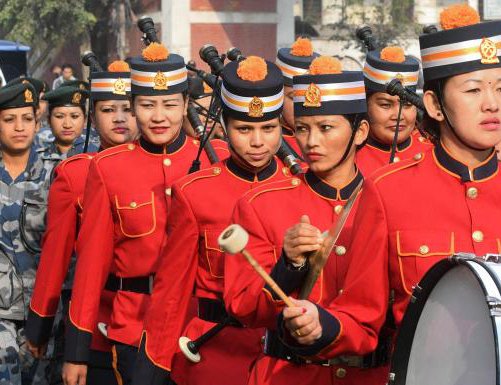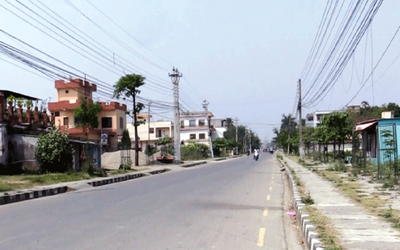
From their quarters in the former British mission in Kathmandu, Indian ambassadors have long been assailed by Nepalis for intervening in the country’s turbulent politics with the imperious manner of viceroys of the Raj.
In a a country where a bloody act of regicide in 2001 was followed by the overthrow of the monarchy seven years later, it is Delhi’s envoys who have acted as kingmakers as 10 prime ministers came and went in a decade of political upheaval.
But the era of making and breaking Nepal’s fractious coalitions — via threats and inducements delivered from the large wooded compound inherited from Britain’s legation after 1947 — has come to an end, for now at least.
Marxist and Maoist politicians are moving into ministerial offices in Kathmandu after their Left Alliance coalition swept aside the pro-Indian Nepali Congress in elections late last year.
Beijing has tersely denied rumours swirling through Kathmandu’s dust-cloaked streets that it brokered the pact between the long-time communist foes. But there is clearly a new powerbase in town — the embassy of the People’s Republic of China.
KP Sharma Oli, the Marxist leader and new prime minister who spent 14 years as a political prisoner as a young man, has made clear that Nepal will no longer rely on India for trade and support.
As a buffer state on the roof of the world, the small Himalayan nation is the latest setting for the power plays of its giant Asian neighbours, across the mountains to the north and plains to the south.
To very public jitters in Delhi and quiet pleasure in Beijing, China seems to have notched another convert to the grandiose “new Silk Road” infrastructure project of President Xi Jinping to connect his country by land and sea via Asia to the Middle East, Europe and Africa.
Pakistan, Sri Lanka and the Maldives have all welcomed Chinese investment and security assistance as part of Xi’s Belt and Road Initiative, driving a fear in Delhi that it is being encircled in its South Asian “backyard”.
Fears of a military showdown between India and China over a remote plateau near the two countries’ borders with Bhutan have also resurfaced. Doklam was the flashpoint for a tense stand-off between their security forces last summer and India media has recently reported a new Chinese build-up.
The intrigues and machinations in the region echo the so-called Great Game that Britain and Russia waged for trade routes and influence over Central Asia during the 19th century.
Oli was long close to Delhi. But he turned against his old allies after pro-Indian factions in southern Nepal launched a trade blockade of the landlocked borders in protest at a new constitution in 2015.
The punishing embargo, which crippled Nepal just months after a devastating earthquake, stoked nationalist anti-Indian sentiments that have now swept Oli and his leftist allies to power.
The new leader has already announced the revival of a Chinese-built dam project, suspended by his predecessor under pressure from India, and he has expressed enthusiasm for the extension of a railway from Tibet into Nepal.
At Kathmandu’s Durbar Square, where the ancient palace and shrines were badly damaged by the earthquake, visitors now pass beneath an arch topped with the Chinese flag and lined with posters trumpetting a Beijing-funded restoration project.
From hydropower to construction, Chinese businesses are moving in. And China has also started to make inroads with Nepalese security forces, as symbolised by the impressive new training academy of the Nepal armed police force. The complex, a US$350 million gift from China, stands in sharp contrast to other dilapidated Nepalese security facilities.
“The Chinese have quietly told their Nepalese counterparts that they will supply anything they need, as long as they do not also ask for help from the Indians or the West,” said Geja Sharma Wagle, an international security analyst and former government advisor.
Nepal has been no stranger to violent turmoil since the crown prince shot dead the king and several family members before turning his gun on himself in 2001.
After the end of a bloody decade-long Maoist insurgency in 2006 and the transition to a republic two years later, the querulous communist parties both held office for short stints via the ballot rather than the bullet.
But the Left Alliance now seems set for years in power after its crushing election victory and merger talks are advancing to create a single party, its ideology closer to social democracy than the ideological labels suggests.
Yuba Raj Khatiwada, a former central banker appointed as finance minister, took time off from receiving the greetings of well-wishers at his office to insist that country would now pursue policies independent of both dominant neighbours. “We’re not pro-China or pro-India, we’re pro-Nepal,” he said as he outlined plans to streamline foreign investment.
Narendra Modi, India’s prime minister, is belatedly trying to woo back its “little brother”, placing three phone calls to Oli and dispatching his foreign minister and army chief on visits.
It is an uphill struggle. “India is losing Nepal to China because of the failure of its coercive diplomacy,” said Wagle.
But many Nepalese are also wary about the risks of rushing into Beijing’s fold, looking south to the woes of Sri Lanka which has been plunged into a debt trap in its dealings with China.
“India is the old friend we knew too well and that familiarity has bred contempt,” said Hari Sharma, a political analyst and former prime ministerial advisor. “China are the new kids but our politicians need to be very careful about how they embrace us.”
Courtesy: The Sunday Times















